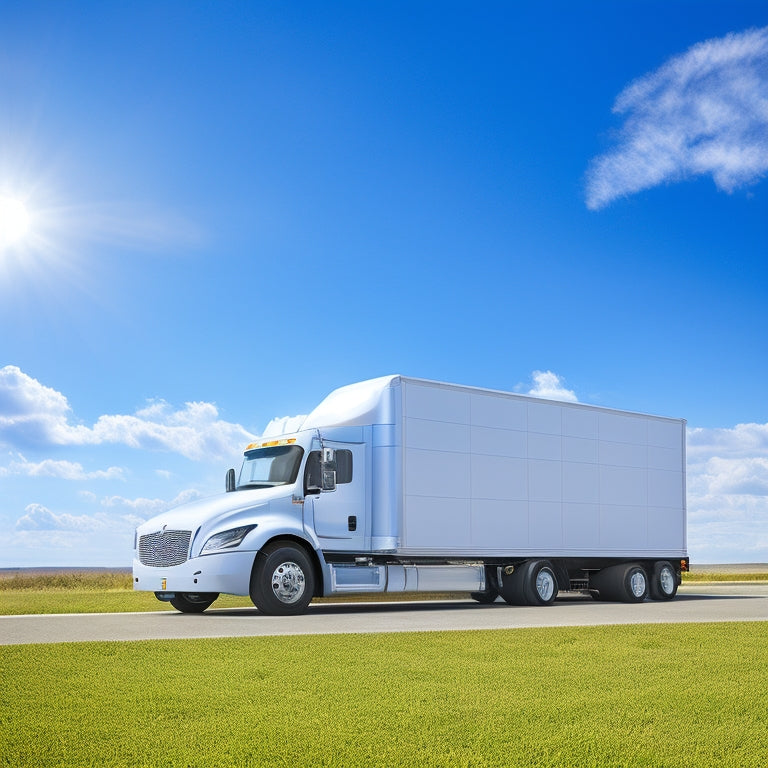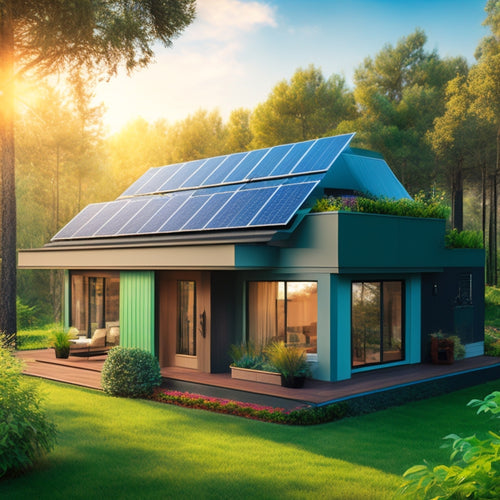
Roof-Mounted Energy Solutions for Box Trucks and Vans
Share
You're looking to upgrade your box trucks and vans with roof-mounted energy solutions to reduce your fleet's carbon footprint and operating costs. By installing solar roofing systems, you can decrease your reliance on fossil fuels, lower operating costs, and increase profit margins. To get started, consider choosing high-efficiency solar panels, balancing size and weight considerations, and selecting budget-friendly options that meet your energy needs. By doing so, you'll be well on your way to maximizing energy efficiency gains and minimizing downtime. As you explore these solutions, you'll discover even more ways to optimize your fleet's performance and reduce its environmental impact.
Key Takeaways
• Opt for high-efficiency solar panels with anti-reflective coating to maximize energy output for box trucks and vans.
• Ensure a structurally sound roof by considering weight and size constraints during installation to prevent damage.
• Strategically position solar panels to reduce shading and optimize energy harvesting, guaranteeing continuous power availability.
• Select suitable energy storage solutions, such as battery swapping, to minimize downtime and ensure peak performance for box trucks and vans.
• Regular inspections and gentle cleaning are crucial for maintaining optimal performance and extending the lifespan of roof-mounted energy solutions.
Benefits of Solar Roofing Systems
By integrating solar roofing systems into your box truck or van, you can greatly reduce your reliance on fossil fuels and lower your carbon footprint. This is an important step towards a more sustainable future, and it's a smart business move too. With solar roofing, you'll reduce your operating costs and increase your profit margins. Plus, you'll be contributing to a cleaner environment, which is essential for the well-being of your customers and the planet.
One of the most significant benefits of solar roofing systems is carbon reduction. By harnessing the power of the sun, you'll decrease your dependence on fossil fuels and lower your greenhouse gas emissions. This is essential for reducing air pollution and mitigating the impact of climate change.
Additionally, solar roofing systems can help reduce noise pollution, creating a quieter and more peaceful environment for you and your customers. By choosing solar, you'll be taking a proactive approach to reducing your environmental impact while also improving your business's bottom line.
Choosing the Right Solar Panels
When selecting the right solar panels for your box truck or van, you'll want to take into account a few key factors.
First, you'll need to think about panel efficiency - how much energy can your panels produce per hour of sunlight?
You'll also need to balance size and weight considerations with your budget to find the perfect fit for your vehicle.
Panel Efficiency Matters
When selecting the appropriate solar panels for your box truck or van, you must take into account the importance, as it directly affects how much power you can generate while on the road. High-efficiency panels can provide more power per unit area, making them ideal for vehicles with limited roof space. You'll want to prioritize panels with high conversion rates, typically above 20%.
Another vital factor is cell temperature, which greatly impacts panel efficiency. Look for panels with a low temperature coefficient, as they'll perform better in hot conditions. Additionally, consider panels with an anti-reflective coating to minimize panel reflection, allowing more sunlight to be absorbed. This feature is particularly essential for vehicles that operate in sunny or high-altitude environments.
Size and Weight Considerations
You need to carefully consider the size and weight of your solar panels to make sure they fit your box truck or van's roof space and won't compromise its structural integrity. A larger panel may provide more energy, but it may also put too much weight on your roof, potentially causing damage or even collapse.
Opt for panels that are specifically designed for roof-mounted installations, as they're engineered to be lightweight and durable. Material selection is important; look for panels made from high-quality, lightweight materials that can withstand harsh weather conditions.
Additionally, consider structural reinforcement options to guarantee your vehicle's roof can support the added weight of the solar panels. This may involve installing additional support beams or reinforcements to distribute the weight evenly.
Budget-Friendly Options
Choosing the right solar panels for your box truck or van can be a cost-effective way to harness renewable energy. It's important to explore budget-friendly options that meet your energy needs without breaking the bank. As you consider your options, look for manufacturers that offer cost-sharing programs or fleet discounts. These can greatly reduce the upfront costs of installing solar panels on your vehicle.
For instance, some companies offer discounts for bulk orders, which can be beneficial if you're outfitting an entire fleet of vehicles. Additionally, some government agencies and organizations offer incentives for businesses that adopt sustainable energy solutions, so be sure to research these opportunities as well.
Commercial Vehicle Energy Challenges
Operating commercial vehicles, such as box trucks and vans, poses significant energy challenges due to their high fuel consumption and emissions. As a fleet operator, you're likely familiar with the struggles of keeping your vehicles on the road while minimizing their environmental impact. Two major energy challenges you face are fuel inefficiencies and battery drainage.
| Energy Challenge | Description | Impact |
|---|---|---|
| Fuel Inefficiencies | Idling, inefficient routes, and poor vehicle maintenance lead to wasted fuel and increased emissions. | Increased fuel costs, higher emissions |
| Battery Drainage | Accessories like lights, radios, and laptops can quickly drain your vehicle's battery, leaving you stranded. | Increased downtime, decreased productivity |
| High Energy Demand | Refrigeration units, liftgates, and other equipment require a lot of power, putting a strain on your vehicle's electrical system. | Overloaded electrical systems, reduced lifespan |
| Inadequate Charging | Inadequate charging infrastructure and limited access to charging points hinder your ability to keep your vehicles on the road. | Decreased productivity, increased costs |
Designing for Optimal Energy Harvest
When designing for best energy harvest, you'll need to take into account two important factors.
First, you'll want to maximize energy output by selecting the right components and configuring them for peak efficiency.
Next, you'll need to strategically place solar panels to maximize energy generation, taking into consideration the vehicle's layout and usage patterns.
Energy Output Optimization
To maximize energy output from your box truck or van's solar panels, you'll need to carefully consider the system's design and component selection to guarantee maximum energy harvest. This requires a deep understanding of your energy needs and how to optimize your system to meet them.
Energy forecasting plays an essential role in this process, as it allows you to predict your energy requirements and adjust your system accordingly. By analyzing your energy usage patterns, you can identify areas where energy is being wasted and make adjustments to reduce energy consumption.
Load balancing is another critical aspect of energy output optimization. By balancing your energy load, you can ensure that your system is operating within its best range, reducing the risk of energy waste and system failure.
Solar Panel Placement
By strategically positioning solar panels on your box truck or van, you can greatly enhance energy harvesting and reduce the risk of shading, which can severely compromise your system's performance.
As you design your roof-mounted energy solution, consider the importance of Solar Angle Optimization. This involves tilting your panels at an ideal angle to maximize energy output, taking into account your vehicle's location and the time of year.
Additionally, employ Panel Clustering Strategies to minimize shading and guarantee each panel receives adequate sunlight. This might involve grouping panels together in a way that allows for airflow and sunlight to reach each one. By doing so, you'll be able to maximize your system's energy output and reduce the risk of overheating.
Energy Storage for Box Trucks
You're likely aware that your box truck's energy storage system is only as strong as its weakest battery, which is why selecting the right energy storage solution is essential for peak performance and minimizing downtime. A reliable energy storage system guarantees your truck remains operational, even when the sun isn't shining.
When choosing a battery, consider factors like depth of discharge, cycle life, and charging speed. It's important to select a battery that can handle the demands of your truck's electrical systems.
Battery swapping is another critical aspect of energy storage for box trucks. A well-designed battery swapping system enables you to quickly replace depleted batteries with fully charged ones, minimizing downtime and reducing the need for lengthy charging stops.
Additionally, investing in a complete charging infrastructure is crucial for efficient energy storage. This includes installing charging stations at depots, terminals, or other designated stops. By doing so, you can ensure your truck's batteries are always fully charged, ready to power your electrical systems when you need them most.
Installation Considerations for Vans
When installing energy solutions on your van, you'll need to take into account several key factors to guarantee a successful and efficient setup.
First, you'll need to prepare your van's roof to accommodate the energy system, considering the structural integrity and any necessary reinforcements.
Additionally, you'll have to navigate weight and size constraints, as well as select the right mounting system options for your specific energy solution.
Van Roof Preparation
Properly preparing your van's roof is essential to ensuring a successful installation of energy solutions, as a sturdy and clean surface is necessary for securing solar panels, roof racks, or other equipment.
Before installing any energy solutions, you'll need to assess the condition of your van's roof. Check for any existing roof coatings, such as a protective clear coat or a rust-resistant coating. These coatings can impact the adhesion of your energy solutions, so it's important to confirm compatibility.
Next, thoroughly clean the roof surface to remove dirt, grime, and any other substances that might interfere with the installation. Use a mild detergent and water to avoid damaging the roof's surface. A clean and prepared surface is essential for a secure and reliable installation.
Weight and Size Constraints
Taking into account the weight and size constraints of your van is crucial, as oversized or overweight energy solutions can compromise the vehicle's structural integrity and affect its overall performance. You must consider the van's Gross Vehicle Weight Rating (GVWR) and make sure that the energy solution doesn't exceed it.
Oversized solutions can put excessive stress on the van's frame, leading to premature wear and tear, or even catastrophic failure. Additionally, you should also take into consideration the aerodynamic impacts of the energy solution on your van's performance. Large or poorly designed solutions can create drag, reducing your van's fuel efficiency and increasing wind noise.
This can lead to increased fuel consumption, higher emissions, and a less comfortable driving experience. To mitigate these risks, you may need to invest in structural reinforcement, such as additional frame supports or reinforced mounting points. This will help guarantee that your van can safely support the weight of the energy solution and maintain its structural integrity.
Mounting System Options
You'll need to take into account the mounting system options for your energy solution, as the installation method can greatly impact the overall performance and safety of your van.
A secure and reliable mounting system is important to make sure that your energy solution remains in place, even in harsh weather conditions or bumpy roads. Clamping systems are a popular choice, as they provide a sturdy and adjustable grip on the van's roof. These systems usually consist of clamps, brackets, and mounting rails that can be customized to fit your van's specific dimensions.
Rail adapters are also available, which can be used to attach your energy solution to the existing roof rails of your van. When selecting a mounting system, consider factors such as weight capacity, durability, and ease of installation. Additionally, ensure that the system is compatible with your van's roof type and energy solution.
Maximizing Energy Efficiency Gains
To maximize energy efficiency gains, identifying and addressing the primary energy-wasting culprits in your box truck or van's operations is essential.
Conducting an energy audit can help you pinpoint areas where energy is being wasted, allowing you to make targeted improvements.
This thorough assessment will help you identify opportunities to reduce energy consumption, leading to significant fuel savings over time.
Mounting Options for Solar Roofs
As you explore ways to harness renewable energy for your box truck or van, installing solar panels on the roof becomes an important option, and selecting the right mounting system is essential to guarantee a secure and efficient installation.
When choosing a mounting system, take into account the rooftop clearance to make sure there's enough space between the solar panels and the roof to allow for airflow and maintenance access. Proper clearance also helps prevent debris accumulation and reduces the risk of damage from wind or weather.
Structural reinforcement is another vital factor to take into consideration. You'll need to assess the roof's load-bearing capacity to ensure it can support the weight of the solar panels and mounting system. This may involve consulting with a structural engineer or using specialized software to analyze the roof's structural integrity.
Solar Roofing System Maintenance
Regular inspections of your solar roofing system are important to ensuring maximum energy generation and extending the lifespan of your solar panels. By doing so, you'll be able to identify and address any potential issues before they become major problems.
During these inspections, check for loose or damaged connections, signs of wear and tear, and any debris that may be obstructing energy production.
Seasonal cleaning is another vital aspect of solar roofing system maintenance. Dirt, dust, and debris can accumulate on your solar panels, reducing their energy output. Clean your solar panels at the start of each season to ensure peak performance.
Use a soft-bristled brush and mild soap to remove any dirt or debris. Avoid using harsh chemicals or abrasive materials that may scratch the panels.
Upgrading Your Fleet With Solar
You can greatly reduce your fleet's carbon footprint and operating costs by integrating solar power into your box trucks and vans. This upgrade not only benefits the environment but also increases your fleet's efficiency and profitability. By prioritizing solar power, you're taking an essential step towards Fleet Prioritization, making sure your vehicles are equipped with the latest technology to reduce emissions and operating costs.
Here's what you can expect from upgrading your fleet with solar:
-
Increased energy independence: Harness the power of the sun to charge your vehicles' batteries, reducing reliance on fossil fuels and lowering emissions.
-
Reduced downtime: Solar power can keep your vehicles' systems running smoothly, minimizing downtime and keeping your fleet on the move.
-
Improved safety: With solar power, you can make sure your vehicles are equipped with the latest safety features, such as advanced emergency lighting and communication systems.
Frequently Asked Questions
Can Solar Panels Be Installed on Leased or Rented Vehicles?
"When considering solar panels on a leased or rented vehicle, you'll need to review lease restrictions and rental agreements, ensuring you're allowed to make vehicle customizations. Fleet management and installation challenges will also impact your decision."
Do Solar Roofing Systems Affect Vehicle Insurance Rates?
You're wondering if solar roofing systems impact your vehicle insurance rates. Generally, insurance premiums aren't directly affected, but it's important to disclose the installation to your insurer to guarantee policy coverage is maintained.
Are There Any Government Incentives for Solar-Powered Fleets?
Did you know that 70% of fleets that embrace alternative fuels and advanced vehicle technologies receive government incentives? You can benefit from Tax Credits, Green Grants, Federal Subsidies, and State Rebates for adopting solar-powered fleets, offsetting costs and boosting ROI.
Can Solar Panels Be Removed and Reused on New Vehicles?
You can remove and reuse solar panels on new vehicles, thanks to panel refurbishment, guaranteeing energy portability and minimizing waste, but make sure proper disconnection and reinstallation to maintain safety and efficiency.
How Do Solar Panels Affect Vehicle Resale Value?
Coincidentally, you're wondering how solar panels impact vehicle resale value. Surprisingly, they can boost it! A thorough vehicle appraisal and market analysis reveal that eco-friendly features like solar panels often increase resale value, alleviating resale concerns.
Related Posts
-

3 Green HVAC Filters for Solar-Powered Homes
When outfitting your solar-powered home with an HVAC system, you'll want to choose filters that align with your commi...
-

10 Green Waste Solutions Every Homeowner Should Know
You can make a significant impact on the environment by implementing green waste solutions at home. Consider composti...
-

7 Top HEPA Filters for Green Building Projects
You need a reliable HEPA filter for your green building project that aligns with your sustainable goals and guarantee...


